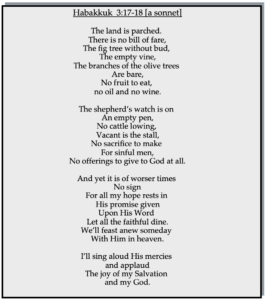I have been unusually contemplative the last few days. This is not to say I have been despondent but more reflective, more aware of the feelings some of the people I have come to care about are feeling while I ramble on spewing my theological opinion. Some of the things God has had to do, told in the stories in the Old Testament, like killing Egyptian innocence and calling it love [Isaiah 43:2, 4] as well as what He has allowed to happen, like natural disasters and man’s cruelty to man, make Him appear distant, uncaring, and if not this, to suggest Him—well—draconian, when He doesn’t get His way.
I feel I have been left to explain Him or somehow spin His actions—or lack of action—in some merciful way—something I never imagined would be a part of ministry. Recently in a Bible study, I thought it an exciting idea to review the 7 sacrifices Moses wrote about. These speak of Christ and His death for our salvation. I forgot that someone whom I care very much about, and who was in this study, owns a farm on which they are raising some of the world’s most lovable little lambs. And here I am talking about butchering them!”
“Happy is anyone who takes no offense in me,” Jesus spoke caringly [Luke 7:23]. One  translation [NLT] put the onus on us! “God blesses those who do not turn away because of [Jesus].” (And then the translator seemed to reconsider in a footnote, “Or who are not offended by me“). Even Jesus, at times, needed to explain Himself and at times the explanation was worse. “I am the bread of life,” Jesus argued with Jewish leaders who sought to entrap Him in His words. They were discussing “manna.” And then the Savior raised His voice and cried, “unless you eat the flesh of the Son of Man and drink his blood, you do not have life in yourselves” [John 6:53]. That’s where He lost them. John 6:66 is one of the saddest scriptures: “From that time many of his disciples went back, and walked no more with him.” I have come to cherish Peter’s response to all of this when the Savior asked him if he, too, would leave, “Lord, to whom will we go? You have the words of eternal life.” Spot on, my brother!
translation [NLT] put the onus on us! “God blesses those who do not turn away because of [Jesus].” (And then the translator seemed to reconsider in a footnote, “Or who are not offended by me“). Even Jesus, at times, needed to explain Himself and at times the explanation was worse. “I am the bread of life,” Jesus argued with Jewish leaders who sought to entrap Him in His words. They were discussing “manna.” And then the Savior raised His voice and cried, “unless you eat the flesh of the Son of Man and drink his blood, you do not have life in yourselves” [John 6:53]. That’s where He lost them. John 6:66 is one of the saddest scriptures: “From that time many of his disciples went back, and walked no more with him.” I have come to cherish Peter’s response to all of this when the Savior asked him if he, too, would leave, “Lord, to whom will we go? You have the words of eternal life.” Spot on, my brother!
I suppose at times God seemed cognitively dissonant. He instructed Hosea to marry a prostitute [Hosea 1:2] which represented in His mind Israel’s unfaithfulness. God was hurting—even if we can’t see it! (Marrying a prostitute was forbidden to the priests, Leviticus 21:7. According to Deuteronomy 22:21 virginity at marriage was sacrosanct.)
 Many maintain, as the song goes, “We’ll talk it over in the bye and bye. I’ll ask the reasons; He’ll tell me why.” There is some truth here, but more immediately it helps to understand that mercy must be administered by a judge, The Judge, and our limited understanding of His rulings, His form of justice, is what probably bothers us most. Yet, Abraham seemed to know, “Shall not the Judge of all the earth do right?“[Genesis 18:25]
Many maintain, as the song goes, “We’ll talk it over in the bye and bye. I’ll ask the reasons; He’ll tell me why.” There is some truth here, but more immediately it helps to understand that mercy must be administered by a judge, The Judge, and our limited understanding of His rulings, His form of justice, is what probably bothers us most. Yet, Abraham seemed to know, “Shall not the Judge of all the earth do right?“[Genesis 18:25]
Amen, Brother, Amen.
[Written in loving concern with empathy and understanding]


